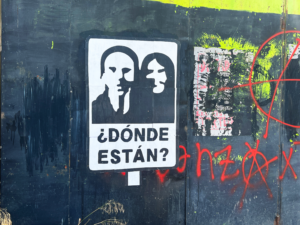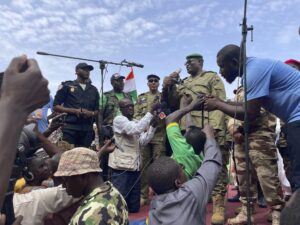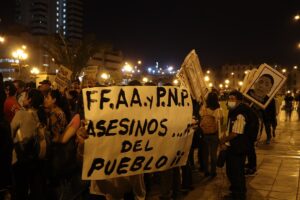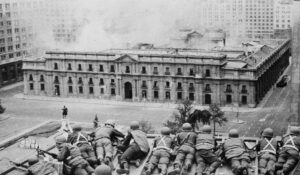The Unquiet Agony of the Young Doves: Thailand After the Coup
Using terror to silence people is a method that gets results in Thailand. I have noticed that the medicine given in order to create fear is of different strengths depending on one’s social position. Nachacha Kongudom, 21, raises a three-fingered salute outside a cinema where “The Hunger Games: Mockingjay -- Part 1” was showing in Bangkok last November. Police detained three students at the opening of the film. Opponents of last May’s military coup in Thailand have adopted the movie’s three-finger salute as a show of defiance, which has led to its banning by the military-imposed government. AP/Sakchai Lalit
Nachacha Kongudom, 21, raises a three-fingered salute outside a cinema where “The Hunger Games: Mockingjay -- Part 1” was showing in Bangkok last November. Police detained three students at the opening of the film. Opponents of last May’s military coup in Thailand have adopted the movie’s three-finger salute as a show of defiance, which has led to its banning by the military-imposed government. AP/Sakchai Lalit
Editor’s note: This article is the latest in a series called Global Voices: Truthdig Women Reporting. The project creates a network of female foreign correspondents in collaboration with the International Women’s Media Foundation.
Click here to support the women of Global Voices with a tax-deductible donation.
Dozens of books were torn up and burned on a clay stove in the kitchen. This included a book of music, “The White Dove,” which was the favorite poetry book of a child who was not aware of politics, and was not aware that there was the elimination of young doves, from both death and being.
— My memory of the Oct. 6, 1976, massacre
Oct. 6, 1976: A distorted photograph became the fuse that resulted in the massacre of students at Thammasat University. Right-wing newspapers distorted a photograph of a play portraying the hanging of two electrical workers and said that the play constituted defamation of the prince (his rank at that time). Two hundred military radio stations used it to incite the massacre. As a result, there were 46 deaths that were counted, and more than 100 people whose deaths were not recorded. Hundreds were injured and student leaders were imprisoned. Young men and women chose to leave the cities for the jungle because their homes were no longer safe.
Oct. 6, 1996: Twenty years passed after the Oct. 6, 1976, massacre before there was an opportunity to hold the first commemoration. This was a time in Thai society when democracy was once again standing on its own two feet. The events of Black May in 1992 awakened the people, and the soldiers were forced back into the barracks to solely be “professional soldiers.”
Oct. 6, 2013: The commemoration this year was larger than usual because it was the 40th anniversary of Oct. 14, 1973. Traditionally, the commemorative event was dull and young activists secretly teased that it was the “Ching Ming Festival of the Octobrists.” This year the event changed and it was an exhibition of “Remembering 37 years of Oct. 6 and 40 years of Oct. 14.” The commemoration took place amid a political atmosphere that had grown intense since the Sept. 19, 2006, coup.
Since then, political conflict has divided people into color-coded factions: yellow, red, sky blue. These are subdivided into combinations such as progressive red, free yellow and others. All of this made the artistic and cultural commemoration of the month of October more exciting than usual, and included Chinese opera, likay [Thai folk drama], music, and “The Wolf Bride,” a stage play. The play was performed by the Prakai Fai theater group, whose members were part of the new generation of activists. They joined together on an ad hoc basis for this performance. The satirical comedy presented by this unknown theater group was met with applause, laughter and satisfaction.
On Oct. 30, 2013, not long after the performance, the Royal Monarch Alert Protection Network organized a meeting of its members and more than 200 attended. They played clips of the stage performance of “The Wolf Bride.” More than 50 people present put their names down as volunteers to make appointments at their local police stations to file complaints under Article 112 (of the Criminal Code, which stipulates that “whoever defames, insults or threatens the King, the Queen, the Heir-apparent or the Regent, shall be punished with imprisonment of three to fifteen years”) against the theater group on Nov. 1. At the same time, the Senate Committee to Monitor the Enforcement of Laws and Standards Related to the Protection of the Monarchy invited the organizers of the commemorative events to give their accounts as part of the investigation of the staging of the play.
Oct. 6, 2014: Pornthip Munkhong, or Golf, the director of “The Wolf Bride,” and Patiwat Saraiyaem, or Bank, a fine arts student at Khon Kaen University and one of the actors, have become political prisoners. They are suspects in a national security case of alleged violation of Article 112, or lèse majesté, due to the play that they performed during last year’s commemoration of the October events.
If the play “The Hanging” was once like a goat leading society astray in the past, then the play “The Wolf Bride” is like a lamb that is being relentlessly hunted in the present. It is a ridiculous cycle, but there is no laughter. The persecution and coercion forces the young doves to bow down. Some have been hunted down. Some cannot bear it and must flee to live in another land.
Golf is a small young woman who is full of strength. When I saw her behind the bars at the Criminal Court, she looked more gaunt than usual. The energy with which she once glowed, and which those close to her could feel, seemed astonishingly faint. Speaking to me as if lamenting to herself, she said, “I have to be strong and do whatever I can to kill time to make it pass by quickly in here, right?” I swallowed the lump in my throat and simply nodded.
Bank studied and trained in local music and is proud to be an Isan (northeastern) artist. In August 2013, he won a contest for children’s lullabies, in the category of Isan children’s lullabies. Even after his freedom was taken from him, he still pushed himself to practice singing mor lam (northeastern folk music). He told his university friends who went to visit him that “I am human and I have to struggle. You do not need to worry. I have adjusted myself already and I do not have any problems.” Even though Bank held firm to this, some of his older friends who visited him could not help but worry how long he would be able to remain a cheerful young man.The phenomenon of questioning and refusing authoritarian ways or means, and refusing to follow the phu yai [bigwigs], is very un-Thai and contrary to the “12 core values” of the National Council for Peace and Order. It cannot be denied that the refusal by one segment of the new generation to acquiesce and be easily brainwashed has been influenced by growing up with access to Internet media, along with political violence, including coups, media censorship and constriction of freedom of expression. The political demonstrations and the dispersal of the red shirt demonstrations in 2010 resulted in sacrifices by the people and became the fertilizer and water that nourished these members of the new generation to become firm in their questions and the confidence to determine their own futures.
Saran Chuaychai, or Aum Neko, is one among this new generation. Aum is sincere in her examination and challenging of authoritarian and sexually unequal customs and traditions. She has fought against university regulations that force students to wear uniforms. After the passage in the reading stage of the draft amnesty bill, she and activist friends dressed up as corpses and protested in front of the Pheu Thai Party headquarters to demand justice for people who lost their lives in the dispersal of the red shirt demonstrations in 2010.
From the May 22, 2014, coup until Oct. 10, according to information compiled by the Internet Dialogue on Law Reform, the National Council for Peace and Order has summoned 582 persons to report themselves. Aum is one among this number. She was summoned to report herself on June 10 and a warrant for her arrest was issued three days later. Aum chose to flee to live in another land rather than be forced to bow down to illicit authority in her native land.
Using terror to silence people is a method that gets results in Thailand. I have noticed that the medicine given in order to create fear is of different strengths depending on one’s social position. In addition, in different areas, the authorities act differently. People in the provinces, especially in the north and northeast, face threats of a greater order of terror.
Worawut Thuagchaiphum, a recent graduate of Mahasarakham University, demonstrated in opposition to the coup and has been summoned to the local army camp four times. He reported himself for the third time in August. Unlike the first time, there was no letter sent to the university, but he was confronted with the same order from the soldiers to stop all of his political activities. If he did not stop, his family would be tormented. It was not clear what this torment would entail. But soldiers went to live at the temple near his house and went to his house to ask questions. Officials called to say that he had committed crimes during the period after martial law had been declared. Soldiers also went to search the restaurant next to the university where he worked.
After Worawut reported himself for the third time, he gave a detailed interview to Prachatai about the threats and psychological operations he met with after the coup. A soldier assured him that “I will send people to follow you at all times. Don’t think that you can escape my eyes. And do not assume that I lack connections inside the university.” After that, the soldiers ordered him to leave the area. With the most recent summons, he hid from the soldiers and refused to report himself. He is another person who chose to travel and flee to live in another land.
Under martial law, education, expression and political demonstration of opposition to the coup have been banned. Nevertheless, there are attempts to find ways to move under this restricted set of rules. The League of Liberal Thammasat for Democracy has organized three “Democracy Classroom” events. Every time, officials have tried to shut them down. During the second event, which was about the decline of dictatorship in foreign countries, Nidhi Eoseewong, an important Thai historian, was able to give only 30 minutes of his lecture. The police asked him to stop his lecture and took him and the student organizers into custody at the station. The students were released after signing an agreement to ask the permission of the National Council for Peace and Order before they organized their next event.
They continue to struggle in reaction to the university administrators, whom they view as enemies of democracy. They have had to face surveillance and threats, but they pressed on and held another Democracy Classroom event on Oct. 14, 2014. They acted according to the terms to which they had agreed and requested permission from the officials. The topic was “From October 14 to Hong Kong: The Student Movement and Democracy,” and the event took place amid surveillance by dozens of police officers.
Nattisa Pattamapornpong, a student in the Faculty of Education at Chulalongkorn University, said to one of her friends in the Thai Student Center for Democracy that “all I know is that everything is risky, but it is better than not doing anything at all. I am not afraid or worried about anything in particular.” She acknowledges being the leader of those who placed a banner across a pedestrian bridge in front of Chulalongkorn University that read “8 years since September 19, 2006, Democracy was killed and remains dead.” The banner was in remembrance of Nuamthong Phraiwan, a taxi driver who hung himself in protest of the Sept. 19, 2006, coup. Approximately two weeks after they hung the banner, Nattisa and Thapakorn Kaewlangka, a student in the Faculty of Engineering, were called to the Pathumwan police station and informed that they had been accused of violating Article 10 of the Cleanliness and Order Act and were fined 1,000 baht (approximately 30 USD).
The Thai Student Center for Democracy was founded three days after the coup on May 25, 2014, through the collaboration of activists and students from independent groups at various universities. The center’s first activity was to engage in symbolic protests of distributing and eating sandwiches in opposition to the coup. Nine members of the group were arrested and later released. “During a tense political situation when there were significant threats to freedom, many symbolic protests nevertheless took place in the name of the TSCD,” is written cross the top of the group’s website, and reflects its understanding of the situation and risks it faces.Piyarat Jongthep, a graduate student in the Faculty of Law at Thammasat University and an important member of the Thai Student Center for Democracy, said in an interview with Matichon newspaper that “if I can do as I think and as I dream, I will have happiness. But when a set of rules comes down to block me, my happiness begins to fade. We have the happiness that we try to find, but it is spare.” He further explained that what he believes and does “would not be illegal if it was an ordinary time in our country. But in a situation like this, I am perhaps guilty from the perspective of the soldiers. But from the perspective of democrats, you could perhaps say that what I believe and do are correct. Therefore, I choose to stand like people the world over.”
A message, “Are we going to step over it all like we used to? Are we going to walk forward, or surrender and walk back the same way?” was on top of the program of a play, “Red Tank” (thang daeng) in a series of plays, “Satapana,” by Teerawat Rujintham and the B-Floor Theatre. Its work tends to speak to social and political problems, especially the restriction of freedom of expression. Luck still holds out: There is space for art to flex and serve as a release.
Two months have passed since Golf was imprisoned. She has submitted four petitions for temporary release, but with no effect. The court gives the reason that the case is grave and there is concern that the accused may flee. Her work directing a play has resulted in her becoming a suspect in a case of violating Article 112. She works to be strong even though she dwells within the difficulties of incarceration. She wrote a children’s fable, “Little Foot,” to share with the young people for whom she used to lead activities.
After reading “Little Foot,” I felt that her writing of the fable helped make it possible for her to take a breath. At the end, I understood that she had used the words to give herself encouragement. It’s amazing that what she wrote is very similar to what other people who are avoiding imprisonment by creeping along the strand of freedom outside the cell are also experiencing:
“ ‘Walk on in the darkness. To walk partially on the right path and partially on the wrong path is still better than not forging forward at all,’ Little Foot thought in his heart. …”
Your support matters…Independent journalism is under threat and overshadowed by heavily funded mainstream media.
You can help level the playing field. Become a member.
Your tax-deductible contribution keeps us digging beneath the headlines to give you thought-provoking, investigative reporting and analysis that unearths what's really happening- without compromise.
Give today to support our courageous, independent journalists.








You need to be a supporter to comment.
There are currently no responses to this article.
Be the first to respond.